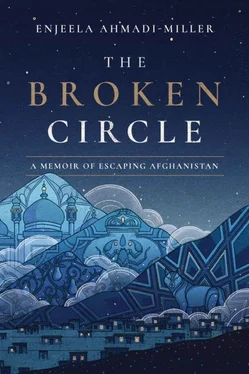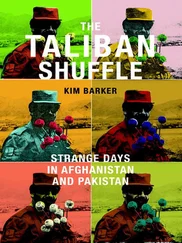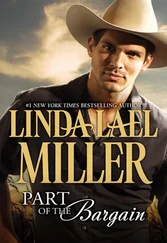The rapid fire of machine guns echoed across the hills and rippled along the canyons, soon followed by the boom of cannons and bombs. The gunfire and thud of shells hitting the ground seemed part of nature. It was part of the life we were living that even as the din grew louder, as if it were in the adjacent canyon, we didn’t stop to wait it out. The battle noise didn’t cause dread in me like it used to. It was evident that Masood had climbed these mountains many times before. He had kept us a couple of steps from the pitched battles for months now. No one, not even Laila, questioned where he was leading us.
After nearly a week of trekking upward, the road dipped down into one of the many high mountain valleys. In the center lay a small village. It was smaller than the others, with just a few huts crudely constructed with sunbaked mud bricks and timbers bunched around a patch of barren earth. We gathered in the square by a hut for a breather to drink some water and eat a piece of fruit. On the other side of the hard-packed dirt yard, a group of women in long chadors stood around a body wrapped in white cloth. A few of them sat on the ground by the body. A spot of red, like a badge, blotched the body’s chest. It had to be a man—a son or father—killed in the war. The women’s crying and singing a sad lament of loss cast a bitterness over our fatigue. There were no words between us. What was there to say? The men of my country were being slaughtered, and there was nothing we could do but escape it. We ate quickly and kept to ourselves and then rose and shouldered our packs. The sooner we scaled the last mountain, the farther we would be from seeing any more death and destruction.
I don’t know what the others were thinking as we trudged deeper into the mountains. The path was so rugged, each of us had to watch where we placed our feet. Masood had warned us not to twist an ankle or fall. Injuries would slow us down, and we had to get past the war to a safe village. The rat-a-tat-tat of machine guns echoing down the canyon walls was monotonous. We seemed to be moving toward the sound of an intense battle, but by this time we knew Masood would not go on if it wasn’t safe. I kept my head down and watched each step, and like the others, blocked out the war, the death, the blood.
As the day dragged on, my footsteps became heavier. Hunger bit into my thoughts. I lost myself in thinking of our next resting place. Oh, what a treat fresh food and water would be.
I kept right behind Masood, watching where he stepped, imagining myself taking a hot shower when we reached Peshawar. We filed along a narrow path hemmed in by sheer cliffs that rose on both sides of us. Masood had told us that we would be meeting Padar at a hotel there, and while the thought of reuniting with Padar was what I was most excited about, the anticipation of soap and clean sheets and eating with a fork was almost equally as exciting. We followed Masood along a winding path as the clatter and thump of warfare vibrated off the walls all around us. The angry bursts at times sounded as if they were behind us, then overhead or out in front. It was impossible to know how close we were to the actual fighting. As close as the war sounded, we all kept our heads down, watching our every step on the uneven path. I had gotten so used to the gunfire and thumping of the big guns and explosions, I just kept putting one foot in front of the other. Then we turned on a sharp bend in the path that opened into a wide spot. A sharp burst of an automatic rifle exploded from a pile of rocks above us. I jerked to a stop in fright, and even Masood in front of me stood rock still in surprise. He reached out his burly arm and flattened me against the wall. The others behind me did the same, forcing themselves flat against the rough edge of the mountain.
From the cliff above us, something fired in a puff of smoke and hit an army tank hidden in the rocks at the farthest edge of the clearing. The tank exploded in a fireball, sending a plume of gunpowder and dust into the air. Khaki-uniformed Soviet soldiers in their distinctive steel helmets fired back, aiming high to the cliffs and at a cluster of rocks along the canyon wall, where a line of mujahideen were firing at them with automatic rifles. I pulled up my shirt to shield my nose; the odor of burning machines was so pungent. Jets screamed overhead and unleashed bombs that twirled as they burst into the mountainside. Huge plumes of dirt rained more dust and debris on us. The concussions slapped hard against my eardrums and shook the earth beneath me. I wanted to run, but the smell and shock of the bombs stunned me into a frozen terror. Above us and all around us, freedom fighters fired down on the Soviets until the face of the mountain filled with flashes of flame and smoke. Russian soldiers scrambled for cover, running, shouting, and shooting. Their tanks were on fire. The dead and dying were everywhere. One soldier nearby had his leg blown off, and blood pooled on the ground. I watched in revulsion as the life oozed from the man as he writhed in agony.
Dread filled my arms and legs. Death here would be nothing more than a stray bullet. This was war. Chaos, blood, and smoke. I tried to run, but my feet wouldn’t move.
“Get to a cave,” Masood shouted. He grabbed my arm and yanked me away. “Run, run.” He waved toward the side of the road. As he dragged me along, I couldn’t take my eyes off the war. This was different from watching tanks and soldiers drive around Kabul. Men were shouting and firing at each other. Soldiers were on the ground bleeding and dying. Smoke and dust and a hazy pall floated over the road.
Masood yanked on my arm so hard I thought he’d pull it off. I ran alongside the hill, behind him. We passed men in peran tumbans standing in the open, Kalashnikovs gripped in their hands. They swept a tight arc, aiming their fire at Russian soldiers crouched behind a truck. Screams of pain were everywhere. These men had no fear on their faces, just pure concentration.
“I have children here!” Masood called out over and over. All of that cool calm in his voice he’d had every day since we first met evaporated. “I have women and children.”
We ran right past the freedom fighters, who stood in the open, firing, their eyes glazed with the rage of warfare.
“I have children. Don’t shoot, don’t shoot.”
One bearded man wearing a pakol cap and brandishing a rifle yelled at us from the rocks above. He waved for us to come toward him. Masood led us through the rocks to an opening. He pushed us inside as we passed him.
The cave wasn’t very deep, so we pressed back as far as we could, hiding behind rocks or bundled up on the ground. I squatted against the hard rock wall, breathing rapidly, trying to slow down my speeding heart. My forehead was damp from sweat, and my legs weak and tired. My body ached from the fear. I labored to breathe normally.
“Masood,” I whispered after a while, “are we safe?”
He only held a finger to his lips. The fighting went on outside for most of the day. We didn’t move until well after the shooting had stopped. Then only Masood went out to speak to the freedom fighters. From the mouth of the cave, I overheard their conversation. They told him the country would be destroyed unless the Afghan army joined the fight against the Russians. We were all warriors, they said, and we must all fight to protect our country. I remembered Padar telling me how important it was to fight for our country. These countrymen had a difficult time understanding why the Afghan army wasn’t helping their fight. I had seen firsthand in Kabul that the Afghan and Russian armies were on the same side. The defense of the true Afghanistan had been left to civilians.
We stayed with the freedom fighters for several weeks in the caves. A few other families settled down near us. A couple of mothers with young children, and old women bent over with years, carried their meager belongings in baskets and in cloth bundles slung over their backs. The rest of their belongings had been lost in the bombing of their homes. The stories that filtered in with the refugees were of constant dangers and destruction. “The Russians are bombing the villages,” one mother said in a matter-of-fact way. “They don’t know about these caves, so we’re safe here.”
Читать дальше












